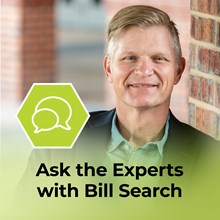Prior to the pandemic, the terms online or hybrid small group weren’t at the forefront of many ministry strategy planning sessions. Fast forward to today and small group directors nationwide are experts on virtual communities. While much has been written about small groups in the digital space, how do we make small groups that meet both in-person and online work? I invited Amber Stewart, Discipleship Support and First Impressions Director at New Hope Baptist Church in Atlanta, to share what she has learned.
Let’s start with the all-important “why” question. Why would a ministry enable and encourage hybrid groups?
Given our current circumstances with the uncertainty and ever-changing dynamics related to COVID-19, at New Hope Baptist we pursued hybrid options as a way to make sure that our entire community could remain connected. Our Family Groups, which are like small groups or Sunday school groups, are the heartbeat of our church and it’s the way we ensure everyone has a place to connect, learn the Word of God, and be a part of our mission.
To that end, we wanted to be inclusive of some of the populations in our church who felt vulnerable, at-risk, or just uncomfortable returning to campus when we re-opened. We’ve seen classes benefit keeping current members connected, but also by bringing in individuals who don’t belong to a church, family group or even live in another state or country.
We’ve experienced the same at Crossings Community Church here in Oklahoma City. It forces you to rethink community! Fortunately, today there are many online format choices. The two most popular platforms for hybrid groups are Zoom and Facebook Live. What are the pros and cons of each?
Most of our family groups are utilizing Zoom. This enables two-way conversation between those in the classroom and those online. Many of our members use Zoom for non-church purposes and are comfortable with it.
The potential challenges with Zoom are centered around the logistics of figuring out the best way to make sure in-class and on-screen participants can hear and speak to one another. Another potential challenge would be the non-video option. The screen feels a bit “lonely” if it’s comprised of many faceless boxes. Also, with Zoom, you will have to pay for the additional meeting time if you don’t have an upgraded account. Overall, we’ve really enjoyed Zoom and we have encouraged our family group leaders to find ways to make it work for them.
Facebook Live is a great option for groups/classes that are lecture or teaching focused. With this format you can simply use your phone or any other device to stream your lesson/material. We’ve encouraged the groups that use Facebook Live to create a closed group so content and sharing remain private. On the flip side, being able to use Facebook Live streaming options from a personal profile page enables someone to reach their entire Facebook audience and not just those in a closed group.
Facebook Live does provide a chat option like Zoom, so although participants can’t be seen or heard, they can comment. This presents a challenge for a single facilitator to keep up with the comments, so we suggest using a moderator.
One of the challenges for hybrid groups is helping everyone feel like they belong. That seems easier if you are either in-person or online. How does a hybrid group include everyone?
Very, very skillfully. Honestly, it’s one of the biggest concerns, but I think our leaders have done a great job of making it work. The placement of the video, microphones, and speakers will determine how easily the leader can navigate between the two worlds. In our family group class, we have two cameras set up—one on the teacher and one on the classroom so those on Zoom can see and hear everyone. We also have a phone logged into Zoom that acts as a microphone and speaker to ensure those on Zoom can hear and be heard. It’s a lot of setup but it allows for the two communities to move, feel and act as one.
We also connect with everyone outside of the meeting time each week through calls, texts, and check-ins to ensure they feel part of a solid community. Our Sunday School lesson is only one part of the community, so we make sure we are building community We also encourage everyone to find fun and creative ways to fellowship given the dynamics.
Two of our groups started using two cameras. People at home appreciate seeing who is in the room. Let’s talk specific technology now. Describe what your groups are using. Are they using laptops? Phones? Tablets? Special web cameras?
All the above! Seriously, the leaders have determined what works best for their group and room location necessary to pull off a great experience.
One thing to note, I think the number of people in-person versus the number of people on screen can also factor as to what makes a good setup better. For instance, if you have two people in person and 30 online, it’s probably wise to cater to the larger audience—of course, not sacrificing access for those in-person. And vice versa—if you have ten people in-person and one person online, you may not need as high-tech of a setup.
We’ve found overall that the best setup involves multiple devices that can provide video and sound for everyone to be able to hear and speak. It may look different by group. Oh, and you must, must, must have great internet connectivity!
Some have said it’s essential to have great lighting and a pleasing background. Have you found this important to the people participating in a hybrid group?
I don’t think it’s essential, but I do think it’s icing on the cake. Now, to some folks, the icing is just as important as the cake, but I am of the mindset that the right cake is just as delicious with or without the icing. If you can get the latest and greatest and take your experience to the next level, do so. However, I wouldn’t let it stop you from getting out the Word and reaching the people because your lighting and background aren’t top-notch.
You make a good point, if the substance and experience are good, the icing is less important. Let’s fast-forward to the future where hybrid groups are a regular part of the ministry landscape. What has to change for that to happen?
That’s a tough question! Mindsets will need to change for hybrid groups to be considered routine. Once we get the technology, equipment, and content planned, prepared and the bumps ironed out then the only thing left will be to embrace this new experience as part of our normal way of doing small group ministry. The more we do hybrid groups, the most we’ll get used to them and see how God uses this new format for His glory and our good.
I agree. We must see it as a valuable contribution to the group experience. I can’t help but wonder as technology changes, internet speed increases, and busy lives accelerate if more groups will add a hybrid option for members who are always on the go. Thank you, Amber, for sharing your experience!
For more tips on hosting online small groups, download Online Small Group Essentials: Making the Most of Your Virtual Community.










